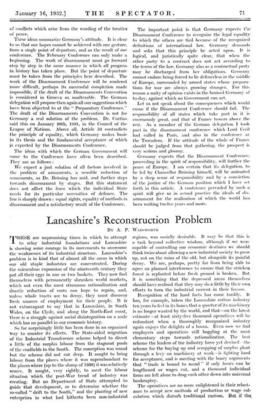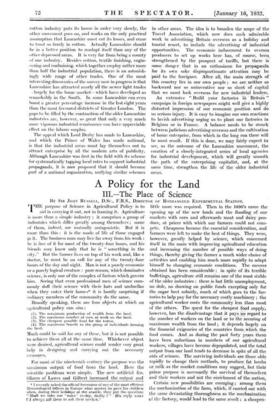Lancashire's Reconstruction Problem
By A. P.
VI ADSWORTH
THESE are unpromising times in which to attempt to relay industrial foundations and Lancashire is showing some courage in its movements to overcome the weaknesses of its industrial structure. Lancashire's problem is in kind that of almost all the areas in which our old staple industries are concentrated. During the miraculous expansion of the nineteenth century they put all their eggs in one or two baskets. They now find themselves with permanently shrunken world markets, which not even the most strenuous rationalization and drastic reduction of costs can hope to regain, and, unless whole tracts are to decay, they must discover fresh sources of employment for their people. It is not extravagant to say that in Lancashire, in South Wales, on the Clyde, and along the North-East coast, there is a struggle against social disintegration on a scale which has no parallel in our economic history.
So far surprisingly little has been done in an organized way to counter its effects. The State-aided migration of the Industrial Transference scheme helped to divert a little of the surplus labour from the stagnant pools of the coalfields to the South. The conception was sound but the scheme did not cut deep. It sought to bring labour from the places where it was superabundant to the places where (up to the slump of 1930) it was relatively scarce. It sought, very rightly, to meet the labour situation which the post-War trend of industry was creating. But no Department of State attempted to guide that development, or to determine whether the so-called " drift to the South," and the planting of new enterprises in what had hitherto been non-industrial regions, was socially desirable. It may be that this is a task beyond collective wisdom, although if we were capable of controlling our economic destinies we should think twice about allowing a new industrial society to grow up, not on the ruins of the old, but alongside its painful decay. We are, perhaps, pretty far from being able to agree on planned interference to ensure that the stricken forest is replanted before fresh ground is broken. But it is something that the depressed areas themselves should have realised that they may do a little by their own efforts to turn the industrial current in their favour.
Recognition of the hard facts has come tardily. It has, for example, taken the Lancashire cotton industry ten years to feel in its bones that a quarter of its machinery is no longer wanted by the world, and that—on the latest estimate—at least sixty-five thousand operatives will be redundant when a thoroughly reorganized industry again enjoys the delights of a boom. Even now we find employers and operatives still boggling at the most elementary steps towards rationalization. The best scheme the leaders of the industry have yet devised —the scheme for the buying up and scrapping of surplus plant through a levy on machinery at work—is fighting hard for acceptance, and is meeting with the hoary arguments that " trade is bound to mend " if only hours can be lengthened or wages cut, and a thousand individual firms are left alone to drag each other down into universal bankruptcy.
The operatives are no more enlightened in their reluct- ance to accept new methods of production or wage cal- ciliation which disturb traditional custom, But if the cotton industry puts its house in order very slowly, the other movement goes on, and works on the only practical assumption that Lancashire must cut its losses, and cease to trust so firmly in cotton. Actually Lancashire should be in a better position to readapt itself than any of the other depressed areas. It is very far from being a county of one industry. Besides cotton, textile finishing, engin- eering and coalmining, which together employ rather more than half the industrial population, there is an astonish- ingly wide range of other trades. One of the most interesting discoveries of the survey now in progress is that Lancashire has attracted nearly all the newer light trades —largely for the home market—which have developed so remarkably in the South. In some Lancashire can even boast a greater percentage increase in the last eight years than the most favoured districts of Greater London. The gaps to he filled by the contraction of the older Lancashire industries are, however, so great that only a very much inure vigorous industrial renaissance can have appreciable effect on the labour surplus.
The appeal which Lord Derby has made to Lancashire, and which the Prince of 'Wales has made national, is that the industrial areas must lay themselves out to attract enterprise by all the modern arts of publicity. Although Lancashire was first in the field with its scheme for systematically tapping local rates to support industrial propaganda, it is now proposed that it should become. part of a national organization, unifying similar schemes in other areas. The idea is to broaden the scope of the Travel Association, which now does such admirable work in advertising Britain overseas as a holiday and tourist resort, to include the advertising of industrial opportunities. The economic inducement to oversee. producers to set up works here has, of course; been strengthened by the prospect of tariffS, but there iF some danger that in an enthusiasm for propaganda for its own sake disproportionate attention may be paid to the foreigner. After all, the main strength of this country- lies in our own people ; we are neither so backward nor so uninventive nor so short of .eapital that we must look overseas for new industrial leaders:
An extensive " Build your faCtorica in 'Britain " campaign in foreign newspapers might Well give a highly distorted impression of our economic position and dO us serious injury. It is easy to imagine our own reactions to lavish advertising urging us to plant our factories in Belgium or in France. A balance needs to be struck between judicious advertising overseas and the cultivation of home enterprise, from which in the long run there will be most result. If this is done, we may fairly expect to see, as the outcome of the Lancashire movement, the creation of a closely-integrated series of local agencies for industrial development, which will greatly smooth the path of the enterprising capitalist, and, at the same time, strengthen the life of the older industrial areas.



































 Previous page
Previous page